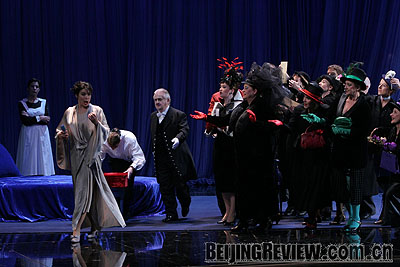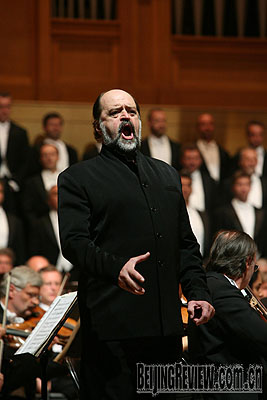|

A NIGHT AT THE OPERA: Actors and actresses from Deutsche Oper Berlin perform opera Der Rosenkavalier on October 5 in Poly Theater
The audience at the Forbidden City Concert Hall was held spellbound on October 2, as they sat back and were spoiled for choice at the opening of the 11th Beijing Music Festival.
Popular Chinese classical singers Liao Changyong, He Hui, Yang Jie, as well as foreign sopranos including Erica Miller, Manuela Uhl and Heidi Stober, took part in the gala performance, with their renditions of melodies from famous operas such as Pace, pace mio Dio from La Forza del Destino and Habanera from Carmen.
Dating back to 1998, the Beijing Music Festival has developed into one of Beijing's entertainment drawcards and has become one of the world's leading classical music festivals, according to Yu Long, conductor and Artistic Director of the Beijing Music Festival for the past 11 years.
 GOLDEN VOICE: Austrian tenor Kurt Rydl performs at an opera gala at the Forbidden City Concert Hall on October 9
GOLDEN VOICE: Austrian tenor Kurt Rydl performs at an opera gala at the Forbidden City Concert Hall on October 9
Established soloists, renowned orchestras and opera houses from all over the world performed 20 concerts and operas in Beijing this year. The festival focused on grand operas, especially the two masterpieces from the German operatic literature, Der Rosenkavalier and Tannhause, which were performed by Deutsche Oper Berlin.
Deutsche Oper Berlin sent its original troupe, composed of more than 400 people, to perform the two masterpieces. It was the first time this renowned orchestra has sent such a big group to China.
The festival also held a commemorative concert, Bernstein on Broadway, for the 90th anniversary of the birth of Leonard Bernstein, a great American conductor, composer and educator, with his daughter Jamie Bernstein as narrator. The anniversary celebration spanned the globe with two of Bernstein's favorites, On the Town and West Side Story, broadcast in Times Square in New York City.
Spreading the word
Also performed were the more contemporary musical styles of China, showcased by Heroine Trilogy, rearranged by Director Li Liuyi, who finds the perfect balance between Chinese and Western music.
Increasing the popularity of classical music is one of the main aims of this festival. Before every performance, the musicians held free lectures to explain the nuances of the music to the audience. The Deutsche Oper Berlin invited Beijing residents to watch how they rehearse for the operas. Bernstein, now a music critic and music educator, gave two lectures on how to spread classical music to more people based on her father's stories.
The lectures were all held in theaters and universities, including Peking University, one of the most prestigious tertiary institutions in China, and the Central Conservatory of Music, to raise college students' awareness of classical music.
The festival also held a carnival for children to learn how to play different kinds of musical instruments and put on a concert especially catering to a young audience.
Using the Internet to promote classical music was also an option used by festival organizers, who cooperated with kuke.com, a classical music website that provided 100,000 free account numbers for netizens to listen to the classical music on their site.
The festival expects to be followed by a wave that involves more people, especially children, in the wonderful world of classical music. Classical music was introduced to China 35 years ago. Now, more than 50 million children in China are studying violin and piano.
Classical music for all
The major obstacle to raising the popularity of classical music is that it is still considered something elitist by ordinary people in China and around the world. This conception makes it thought to be difficult to understand.
"I am surprised to see the clear separation of people in enjoying classical music, but the situation was kind of similar to that in the United States in my father's days," said Bernstein.
| 